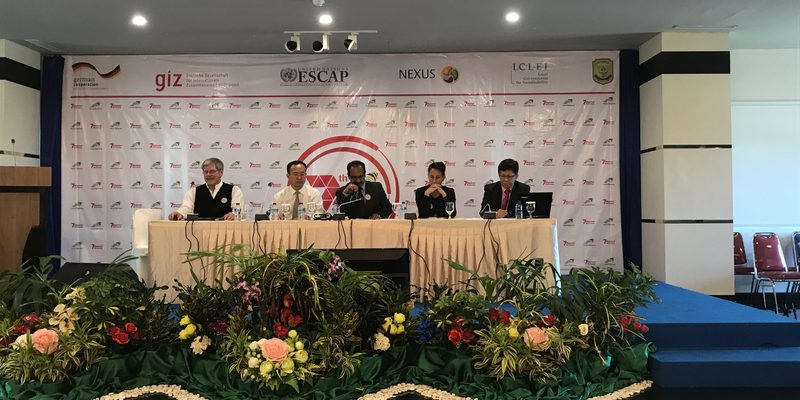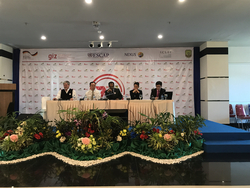Seventh Regional Workshop on Integrated Resource Management in Asian Cities: The Urban Nexus

More than 150 local and international participants representing six National Governments gathered at the Seventh Regional Workshop on ‘Integrated Resource Management in Asian Cities: The Urban Nexus,’ held during the 19th to 21st of July in Tanjungpinang City, Indonesia, to review and discuss their experiences in project implementation over the past year (2016-17). The workshop was organized by the city government of Tanjungpinang in partnership with GIZ and UNESCAP and was attended by representatives from Nexus partner cities, including Nagpur, India; Ulaanbaatar, Mongolia; Naga and Santa Rosa, Philippines; Chiang Mai and Korat, Thailand; Da Nang, Vietnam and China, officials from national ministries, city networks, international organizations, and the private sector. The Urban Nexus project is funded by the German Federal Ministry for Economic Cooperation and Development (BMZ)
The workshop was formally opened by Honorable Lis Darmansyah, Mayor of Tanjungpinang City, Dr. Stefanos Fotiou, Director, Environment and Development Division, UNESCAP, Ms. Ruth Erlbeck, Project Director, GIZ Urban Nexus and Mr. Vic Aquitania, Regional Director of ICLEI South East Asia. Dr. Fotiou highlighted that while cities consume large amounts of natural resources and face a number of environmental and social challenges, they also present opportunities for innovation. Ms. Erlbeck focused on opportunities that the Nexus approach brings to the cities. She urged the cities to stop business as usual practices and make a fundamental shift from a sectoral to a cross-sectoral approach because mere implementation of infrastructural projects in silos will not help cities to grow with limited resources. She also highlighted that the “nexus concept has been increasingly taken up by partner cities” through continued capacity building and provision of technical assistance, especially in the area of infrastructure development.
The two day workshop was divided into six sessions where city leaders and representatives had an opportunity to discuss key drivers that are needed to empower local governments and other stakeholders to mobilize action on urban nexus activities. Dr. Fotiou elaborated on five dimensions and enabling factors for adopting the Nexus approach which include (i) governance (ii) science policy and innovation (iii) inclusive decision making (iv) urban planning and (v) finance and business. Discussions revolved around the key themes of political leadership, institutional capacities and mobilizing resources.
Mr. Emani Kumar, Executive Director, ICLEI South Asia shared his experiences with the Indian cities while implementing projects using the nexus approach. The city of Nagpur presented their approach to ensure citizen participation while preparing their smart city plan thereby focusing on the importance of a participatory approach required for a successful project.
The Urban Nexus project intends to promote a “circular economy” approach where resources such as water, food, and energy are used (and reused) more efficiently and effectively. This workshop also looked at the recently adopted global agendas, in particular, the 2030 Agenda for Sustainable Development and the New Urban Agenda, and discussed how the urban nexus approach can help in their implementation. The workshop ended with field visits to the project sites in the Tanjungpinang City.





